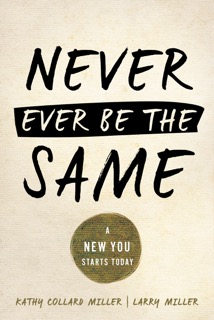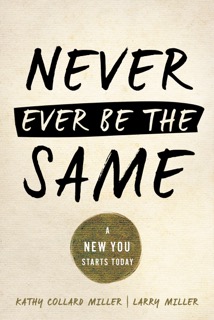Choosing More than 'Grin and Bear It'
Kathy Collard Miller encourages women to trust God so they can make wiser choices. In this Attitude UPGRADE, she challenges a popular statement with a more biblical perspective.
UPGRADE, she challenges a popular statement with a more biblical perspective.
“Things are tough but that’s OK," Kathy says. "I’ll just wait it out and it’ll get better.”
When I (Dawn) find myself in the midst of struggles, I see this as an opportunity to trust the Lord — most of the time. But I'll admit there have been some situations where I tried to "gut it out" myself. And that never works!
Kathy continues . . .
Have you ever considered your trials and found comfort through thinking, “This too will pass”?
That phrase sounds benign enough, but I’m wondering if it leaves out God in some way. Because, at least for me, it supports in my heart an attitude of, “I’ll just grin and bear it until this trial goes away.”
It doesn’t support, “God, even if I have to persevere through this trial for a long time, I’m going to call upon you and not depend upon my own inadequate power.”
Would you like to embrace the second attitude? Here’s how:
1. Recognize how “Grin and Bear It” leaves out God.
I became aware of how I was leaving out God because of that attitude some time ago. As I struggled to trust God for His provision of joy and contentment in the midst of being my mother-in-law’s caregiver, I thought, “This too will pass.”
And then on the heels of that thought came, “If I just knew how much longer Audrey was going to live, I could be more patient and kind.”
I was thinking I could be more patient because I would be gritting my teeth, just waiting for the trial to end. But that’s not depending upon God.
2. Choose active joy not passivity.
“This too will pass” is very passive. It’s allowing circumstances to dictate our responses rather than looking to God.
James 1:2-4 give us the key to active joy:
“Consider it all joy, my brethren, when you encounter various trial, knowing that the testing of your faith produces endurance. And let endurance have its perfect result, so that you may be perfect and complete, lacking in nothing” (NASB).
That verse contains active and “being aware” words, not closing our eyes to God’s help. Being active is when we pay attention to the purposes of difficulties.
Problems become God’s vehicle to growth. That can’t happen if we’re closing our eyes to what God wants to do.
3. Be aware moment by moment.
In the midst of caring for my mother-in-law, I examined that phrase, "This too will pass," more deeply. I saw that I wasn’t living in real time but in the future when things were guaranteed to get better. But there’s no guarantee life will get better. Life doesn’t become perfect until we enter heaven. Each moment and day of our lives is an opportunity to see God’s love strengthen us.
No wonder God doesn't tell us the future.
If we knew a trial was going to last a long time, we'd give up. If we knew a trial was going to be short-lived, we would grin and bear it.
We're supposed to relax in God's power moment by moment, depending upon Him, allowing Him to provide all we need. And then He’ll receive the glory, not us!
These three truths began to transform my thinking. No longer was I depending upon my limited knowledge and my strategy of passivity, but I was seeking God more passionately and seeing His hand of provision. I became more patient with my mother-in-law and saw how God was doing a work in me.
When my mom-in-law left for heaven, I knew I hadn’t been perfect, but I knew God had transformed my life now and it wasn’t in “the sweet by and by.”
That was affirmed when, a short time later, I became the main caregiver for my own mother. God took what He’d taught me and applied it to this new challenge. God never wastes anything, but we won’t see that if we’re just grinning and bearing it.
Examine your own life. Are there ways you have the attitude “this too will pass?” What is God inviting you to do about it?
Kathy Collard Miller loves to help women trust God more through her 50 books and her speaking in over 30 states and 8 foreign countries. Her website/blog is www.KathyCollardMiller.com. Kathy's newest book is Never Ever Be the Same: A New You Starts Today
states and 8 foreign countries. Her website/blog is www.KathyCollardMiller.com. Kathy's newest book is Never Ever Be the Same: A New You Starts Today (Leafwood). It gives insights into the underlying reasons for unhealthy choices and how to have increased trust in God to make wiser choices. It contains biblical principles, insightful stories, and helpful instruction. It also offers individual and group discussion questions.
(Leafwood). It gives insights into the underlying reasons for unhealthy choices and how to have increased trust in God to make wiser choices. It contains biblical principles, insightful stories, and helpful instruction. It also offers individual and group discussion questions.
Graphic adapted: Image courtesy of nenetus at FreeDigitalPhotos.net.
 Post a Comment → Posted on
Post a Comment → Posted on  Thursday, September 17, 2015 at 9:00AM
Thursday, September 17, 2015 at 9:00AM  Grin and Bear it,
Grin and Bear it,  Kathy Collard Miller,
Kathy Collard Miller,  This Too Will Pass,
This Too Will Pass,  Trials,
Trials,  Trusting God,
Trusting God,  Upgrade with Dawn Upgrade Your Life
Upgrade with Dawn Upgrade Your Life  Attitudes,
Attitudes,  Biblical Thinking
Biblical Thinking 















